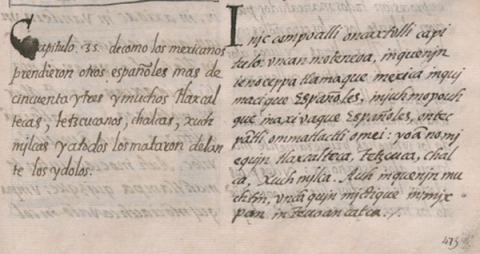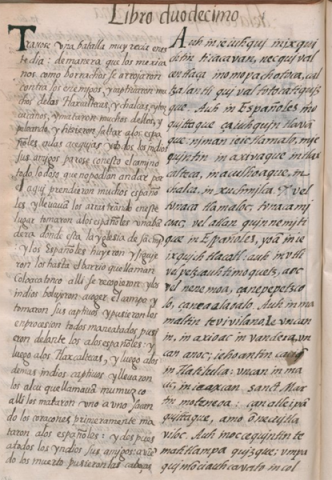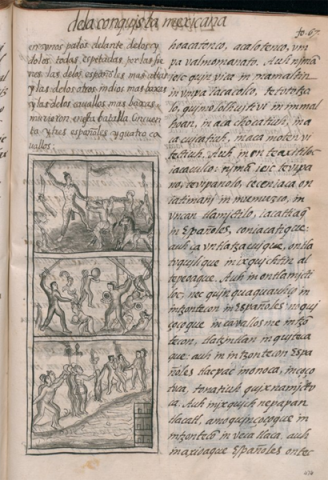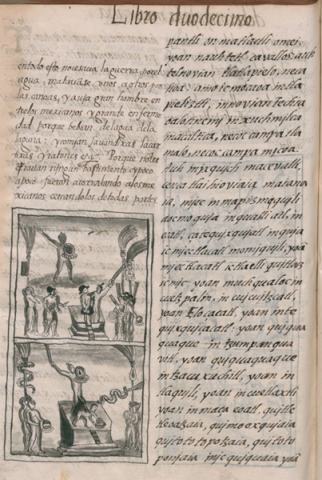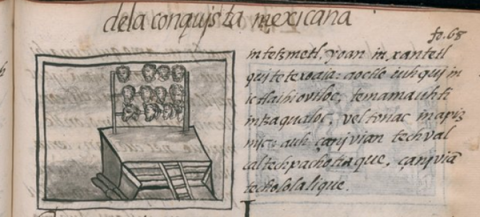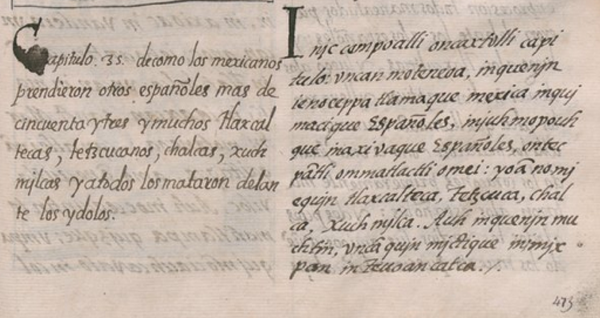 |
[Transcription of the Nahuatl (right-hand column) by James Lockhart:]
[f. 66r., cont.] Inic cempoalli oncaxtolli capitulo: vncan moteneoa, in quenin ie no ceppa tlamaque mexica in quimacique Españoles, in iuh mopouhque in axivaque Españoles, ontecpātli ommatlactli omei: yoā no miequin tlaxcalteca, Tetzcuca, chalca, xuchmilca. Auh in quenin muchtin, vncā quinmictique in imixpan inTeuoan catca./.
|
[Translation of the Nahuatl (right-hand column) by James Lockhart:]
Thirty-fifth chapter, where it is told how the Mexica took captives again—according to the count of the Spaniards they captured, there were fifty-three, as well as many Tlaxcalans and people of Tetzcoco, Chalco, and Xochimilco—, and how they killed all of them before their former gods.
[Translation of the Spanish (left-hand column) by James Lockhart:]
Chapter Thirty-five, of how the Mexica captured more Spaniards, more than fifty-three, and many Tlaxcalans, Tetzcoca, Chalca, and Xochimilca, and killed them all before the idols.
|
[Translation of the Nahuatl into Spanish by Fr. Bernardino de Sahagún; transcription of the Spanish (left-hand column) by James Lockhart:]
[f. 66r., cont.] Capitulo .35. de como los mexicanos prendieron otros españoles mas de cincuenta y tres y muchos Tlaxcaltecas, Tetzcucanos, chalcas, xuchmilcas y a todos los mataron delante los ydolos.
|
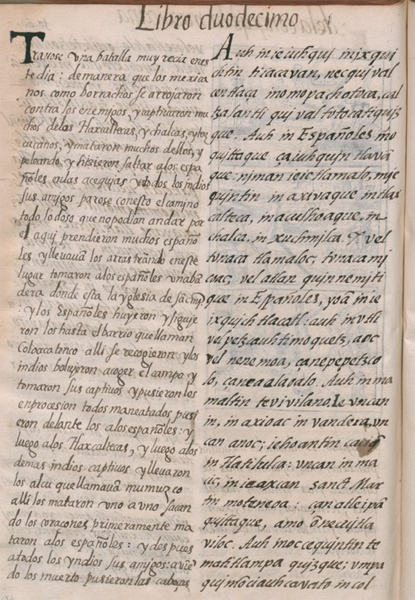 |
[Transcription of the Nahuatl (right-hand column) by James Lockhart:]
[f. 66v.] Auh in ie iuhqui in ixquichtin tiiacavan, nec quivalcentlaça in omopachotoca, caltzalantli quivaltotocatiquizque. Auh in Españoles in oquittaque ça iuhquin tlavāque: niman ie ic tlamalo, miequintin in axivaque in tlaxcalteca, in aculhoaque, in chalca, in xuchmilca .&. vel tonacatlamaloc, tonacamicoac, vel atlan quinnemitique in Españoles, yoā in ie ixquich tlacatl: auh in vtli vel petzcauhtimoquetz, aoc vel nenemoa, ça nepepetzcolo, ça neaalaoalo.
Auh in mamaltin tevivilano. Ie vncan in, in axioac in vandera, vncan anoc; iehoantin caciq̄ in Tlatilulca: vncan in macic, in ie axcan sanct Martin moteneoa: çan atle ipā quittaque, amo ōnecuitlaviloc. Auh in oc cequintin tematitlampa quizque: vmpa quimōciauhcavato in col
|
[Translation of the Nahuatl (right-hand column) by James Lockhart:]
And at this point they let loose with all the warriors who had been crouching there; they came out and chased [the Spaniards] in the passageways, and when the Spaniards saw it they [the Mexica] seemed to be intoxicated. Then captives were taken. Many Tlaxcalans, and people of Acolhuacan, Chalco, Xochimilco, etc., were captured. A great abundance were captured and killed. They made the Spaniards and all the others go right into the water. And the road got very slippery; one could no longer walk on it, but would slip and slide.
And the captives were dragged off. This was where the banner was captured; there is where it was taken. It was the Tlatelolca who captured it, at the place now called San Martín. They thought nothing of it, they did not take care of it. The other [Spaniards] escaped; [the Mexica] harried them as far as Colhuacatonco,
[Translation of the Spanish (left-hand column) by James Lockhart:]
This day the battle was very fierce, so that the Mexica hurled themselves as if drunk against the enemy. They captured many of the Tlaxcalans, Chalca, and Tetzcoca, and killed many of them. In the battle they forced the Spaniards and all their Indian friends to leap into the canals. With all this the road turned so muddy that it was unpassable.
Here they captured many Spaniards and dragged them away. In this place, where the church of San Martin is, they took a banner from the Spaniards. The Spaniards fled, and they pursued them as far as the district they call Colhuacatonco, where they took refuge.
The Indians went back to pick over the field of battle. They took their captives and put them in procession, all with their hands bound. They put the Spaniards in front, then the Tlaxcalans, then the other captive Indians. Taking them to the cu they called Momozco, they killed them there one at a time, removing their hearts. First they killed the Spaniards, then all their Indian friends. After killing them they put their heads
|
[Translation of the Nahuatl into Spanish by Fr. Bernardino de Sahagún; transcription of the Spanish (left-hand column) by James Lockhart:]
[f. 66v.] Trauose vna batalla muy recia en este dia: de manera que los mexicanos como borrachos se arrojaron contra los enemigos, y captiuaron muchos de los Tlaxcaltecas, y chalcas, y tezcucanos, y mataron muchos dellos, y peleando y hizieron saltar a los españoles en las acequias y a todos los indios sus amigos parose con esto el camino todo lodoso que no podian andar por el*
aqui prendieron muchos españoles y llauauālos arrastrando en este lugar tomaron la yglesia de sāc m̄ī: y los Españoles huyeron y siguieronlos hasta el barrio que llaman Coloacatonco alli se recogieron
y los indios boluieron a coger el campo y tomaron sus captiuos y pusieronlos en procesion todos maneatados pusieron delante los** a los españoles: y luego a los Tlaxcaltecas, y luego a los demias indios captiuos y lleuaronlos al cu que llamauā mumuzco alli los mtaron vno a vno sacando los coraçones primeramente mataron a los españoles: y despues a todos los yndios sus amigos: auiēdolos muerto pusieron las cabeças
----------
*TODO LODOSO QUE NO PODIAN ANDAR POR EL. The Nahuatl version is noncommittal on what made the road slippery. One is inclined to think of blood, but Sahagún thought it was mud.
**LOS. This "los" is excess; probably the writer first omitted "a" as in Nahuatl syntax, then remembered it, and ended up with "los" duplicated.
|
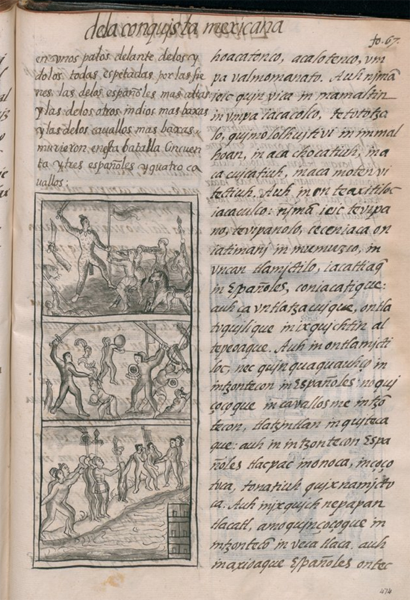 |
[Transcription of the Nahuatl (right-hand column) by James Lockhart:]
[f. 67r.] hoacatonco, acalotenco, vmpa valmomanato.
Auh nimā ie ic quinvica in mamaltin in vmpa iacacolco, tetototzalo, quimololhuitivi in immalhoan, in aca chocatiuh, in aca cuicatiuh, in aca motenvitectiuh. Auh in onteaxitiloc iacaculco: nimā ie ic tevipano, tevipanolo, ceceniaca oniatimani in mumuzco, in vncan tlamictilo, iacattiaq̄ in Españoles, coniacatique: auh ça vntlatzacuique, ontlatoquilique in ixquichtin altepeoaque. Auh in ontlamictiloc, nec quinquaquauhço in intzontecon in Españoles: no quiçoçoque in cavallosme intzōtecon, tlatzintlan in quitecaque: auh in intzontecon Españoles tlacpac in onoca, in çoçotoca, tonatiuh quixnamictoca. Auh in ixquich nepapan tlacatl, amo quinçoçoque in intzontecō in veca tlaca. auh in axioaque Españoles ontec
|
[Translation of the Nahuatl (right-hand column) by James Lockhart:]
at the edge of the canal, where they reformed.
Then they took the captives to Yacacolco, hurrying them along, going along herding their captives together. Some went weeping, some singing, some went shouting while hitting their hands against their mouths. When they got them to Yacacolco, they lined them all up. Each one went to the altar platform, where the sacrifice was performed. The Spaniards went first, going in the lead; the people of all the different altepetl just followed, coming last. And when the sacrifice was over, they strung the Spaniards’ heads on poles [on the skull rack]; they also strung up the horse’s heads. They placed them below, and the Spaniards’ heads were above them, strung up facing east. But they did not string up the heads of all the various [other] people from far away. There were fifty-three of the Spaniards
[Translation of the Spanish (left-hand column) by James Lockhart:]
on some poles before the idols, all pierced through the temples, with those of the Spaniards highest, those of the Indians lower, and those of the horses yet lower. Fifty-three Spaniards and four horses died in this battle. |
[Translation of the Nahuatl into Spanish by Fr. Bernardino de Sahagún; transcription of the Spanish (left-hand column) by James Lockhart:]
[f. 67r.] en vnos palos delante de los ydolos todas espetadas por las sienes las de los españoles mas altas: y las de los otros indios mas baxas y las de los cauallos mas baxas murieron en esta batalla Cincuenta y tres españoles y quatro cauallos:
|
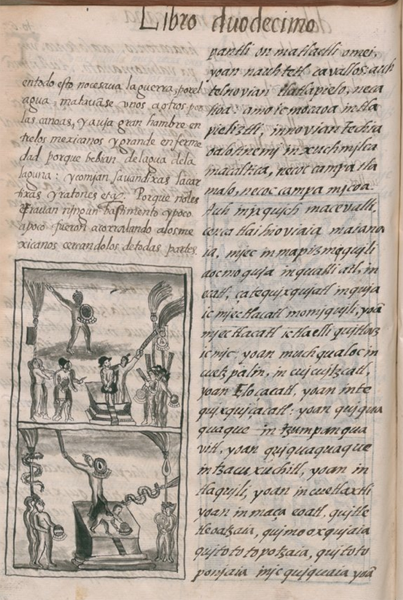 |
[Transcription of the Nahuatl (right-hand column) by James Lockhart:]
[f. 67v.] pantli onmatlactli omei, yoan nauhtetl cavallos:
auh tel novian tlatlapielo, necalioa: amo ic mocaoa in tlapieliztli, in novian techiaoalotinemi in xuchmilca in acaltica, necoccampa tlamalo, necoccampa micoa.
Auh in ixquich macevalli, cenca tlaihioviaia maianaia, miec in mapizmiquili aocmo quia in qualli atl, in ecatl, ça tequixquiatl in quia ic miec tlacatl momiquili, yoā miec tlacatl ic tlaelli quitlaz ic mic: yoan much qualoc in cuetzpalin, in cuicuitzcatl, yoan Eloçacatl, yoan in tequixquiçacatl: yoan quiquaquaque in tzumpanquavitl, yoan quiquaquaque in tzacuxuchitl, yoan in tlaquili,* yoan in cuetlaxtli yoan in maçaeoatl, quitletleoatzaia, quimooxquiaia quitototopotzaia, quitotoponiaia inic quiquaia yoā
----------
*TLAQUILI. Sahagún 1950-1982: 13.104, prefers "frilled flower," a medicinal herb. In either case, the word would end in "-lli" in the writer's normal practice.
|
[Translation of the Nahuatl (right-hand column) by James Lockhart:]
they captured, along with four horses.
Nevertheless, watch was kept everywhere, and there was fighting. They did not stop keeping watch because of [what had happened]. The people of Xochimilco went about in boats surrounding us on all sides; there were deaths and captives taken on both sides.
And all the common people suffered greatly. There was famine; many died of hunger. They no longer drank good, pure water, but the water they drank was salty. Many people died of it, and because of it many got dysentery and died. Everything was eaten: lizards, swallows, maize straw, grass that grows on salt flats. And chewed at colorin wood, glue flowers, plaster, leather, and deerskin, which they roasted, baked, and toasted so that they could eat them, and
[Translation of the Spanish (left-hand column) by James Lockhart:]
In this whole time the battle did not cease on the water, those of each side killing the others in canoes.
There was great hunger among the Mexica, and much sickness, because they drank water from the lake and ate vermin, lizards, mice, etc., because no supplies reached them. Bit by bit they went penning the Mexica in, surrounding them on all sides.
|
[Translation of the Nahuatl into Spanish by Fr. Bernardino de Sahagún; transcription of the Spanish (left-hand column) by James Lockhart:]
[f. 67v.] en todo esto no cesaua la guerra, por el agua matauāse vnos a otros por las canoas,
y auia gran hambre entre los mexicanos y grande enfermedad porque bebian del agua de la laguna: y comian sauandixas lacartixas y ratones eta. Porque no les ētrauan ningun bastimento y poco a poco fueron acorralando a los mexicanos cercandolos de todas partes.
|
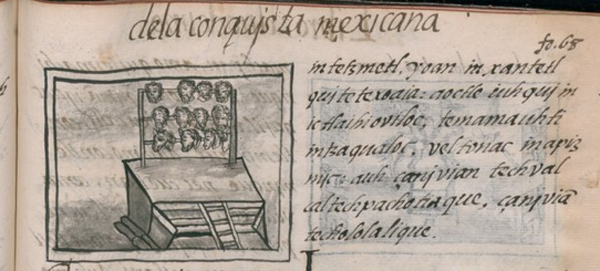 |
[Transcription of the Nahuatl (right-hand column) by James Lockhart:]
[f. 68r.] in tetzmetl, yoan in xantetl quitetexoaia: aoctle iuhqui inic tlaihioviloc, temamauhti in tzaqualoc, vel tonac in apizmic: auh çan ivian techvalcaltechpachotiaque, çan iviā techololalique.
|
[Translation of the Nahuatl (right-hand column) by James Lockhart:]
they ground up medicinal herbs and adobe bricks. There had never been the like of such suffering. The siege was frightening, and great numbers died of hunger. And bit by bit they came pressing us back against the wall, herding us together.
[Translation of the Spanish (left-hand column) by James Lockhart:]
(intentionally blank)
|
[Translation of the Nahuatl into Spanish by Fr. Bernardino de Sahagún; transcription of the Spanish (left-hand column) by James Lockhart:]
[f. 68r., la parte de arriba; un dibujo; sin texto en español]
|
